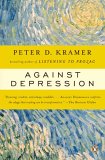Summary | Excerpt | Reviews | Beyond the Book | Readalikes | Genres & Themes | Author Bio

Critics' Opinion:
Readers' Opinion:
First Published:
May 2005, 368 pages
Paperback:
Jul 2006, 368 pages
 Book Reviewed by:
Book Reviewed by:
BookBrowse Review Team
Buy This Book
Interacting with colleagues, submitting to interviews, treating
patients,
I became increasingly aware of a gap between two aspects of
depression:
what it is,
insofar as we can put together recent research findings,
and
what it is to us,
depression as we approach it informally. Our habits
of mind lag. They have roots in traditions that take depression,
or its
distant cousin melancholy, as a sign of heightened awareness,
social disaffection,
moral insight, and creative genius.
I grew up in that tradition. In my college years, traits that
resemble
(and sometimes just are) symptoms of mood disorder were in
vogue,
alienation especially. I read widely in the literature that
takes a journey
through the slough of despond to be a prerequisite for full
humanity. I
saw bravery in the melancholic postures of my classmates,
anhedonic,
self-destructive young men and women who wore their depression
with
panache. Even now, in my years of close contact with depression,
I was
not immune to being charmed—except that when I caught myself in
this attitude, it seemed utterly mistaken.
When I spoke in public, I began to challenge audiences about our
double-mindedness. I used a test question: We say that
depression is a
disease. Does that mean that we want to eradicate it as we have
eradicated
smallpox, so that no human being need ever suffer depression
again?
In posing this challenge, I tried to make it clear that mere
sadness
was not at issue. Take major depression, however you define it.
Are you
content to be rid of that condition?
It did not matter whether I was addressing physicians or
pharmacology
researchers or relatives of patients gravely affected by mental
illness—all proponents of the "medical model of depression."
Invariably,
the response was hedged. Just what do we mean by depression?
What level of severity? Are we speaking about changing human
nature?
I took those protective worries as expressions of what
depression is
to us. Asked whether we are content to eradicate arthritis, no
one says,
well, the end-stage deformation, yes, but let's hang on to
tennis elbow,
housemaid's knee, and the early stages of rheumatoid disease.
Multiple
sclerosis, high blood pressure, acne, schizophrenia, psoriasis,
bulimia,
malaria—there is no other disease we consider preserving. But
eradicating
depression calls out the caveats.
To oppose depression too directly or completely is to be coarse
and
reductionistic—to miss the inherent tragedy of the human
condition.
And here it is not only the minor variants—the psychiatric
equivalents
of tennis elbow—that bear protecting. Asked about eliminating
depression,
an audience member may answer with reference to a novel
that ends in suicide. Or it may be an artist who is held forth,
a self destructive
poet. To be depressed—even quite gravely—is to be in
touch with what matters most in life, its finitude and brevity,
its absurdity
and arbitrariness. To be depressed is to adopt the posture of
rebel
and social critic. Depression is to our culture what
tuberculosis was
eighty or a hundred years ago: an illness that signifies
refinement. Major
depression can be characterized as more than illness, or less—a
disease
with spiritual overtones, or a necessary phase of a quest whose
medical
aspects are incidental.
I retained sympathy with these claims, but in decreasing degree.
It
took only a year or two of immersion for me to discover that I
had
moved a fair distance toward philistinism.
Excerpted from Against Depressionby Peter Kramer. Copyright 2005 by Peter Kramer. Reproduced by permission of Penguin Publishing. All rights reserved. No part of this excerpt may be reproduced or reprinted without permission in writing from the publisher.





The Funeral Cryer by Wenyan Lu
Debut novelist Wenyan Lu brings us this witty yet profound story about one woman's midlife reawakening in contemporary rural China.
Your guide toexceptional books
BookBrowse seeks out and recommends the best in contemporary fiction and nonfiction—books that not only engage and entertain but also deepen our understanding of ourselves and the world around us.